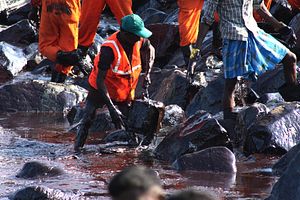As January 2017 wound to a close, the state of Tamil Nadu in India fell victim to another environmental disaster, just as it was recovering from Cyclone Vardah in December 2016. However, this one was entirely man-made and left in its wake a series of questions about the need for a more proactive response mechanism.
Two ships collided off the coast of Chennai, causing a massive oil spill that was both underestimated and underreported in its early stages. Oil rapidly spread, threatening aquatic biodiversity and the safety of those dependent on the seas for both their livelihoods and nutrition. Meanwhile, the port authorities released a statement that no environmental damage along the lines of oil pollution had occurred and the union minister for shipping concurred. The estimates of the amount of oil leaked have since been rising at a frightening pace.
While Tamil Nadu Fisheries Minister D. Jayakumar initially reported that the situation was under control and only one ton of oil had leaked, subsequent estimates by the Indian National Centre for Ocean Information Services (INCOIS) indicate that over 60 tons of oil as sludge or mixture had been removed in just the early days of the subsequent week. The spill covered a 13 kilometer area in just the first couple of days and the delay in receiving credible information has been blamed by activists who have been an integral part of the recovery process.
Volunteer groups, armed with resilience, began the clean-up process making up for the inefficiencies in coordination and communication between the port authorities and the Coast Guard. While the Coast Guard has denied response delays in the initial stages, the port authorities constantly changed the official figures regarding the scale of the spill, which now stands at around 20 tons. The clean-up is expected to stretch into the next week as well, and environmentalists and fishermen have expressed their worries regarding the impact to fish eggs in the upcoming months.
The Dravida Munnetra Kazhagam (DMK) party accused the government of going on the defensive and being callous regarding the issue and took it up with the central government. An inquiry into the causes of the accident has subsequently been sanctioned, and the Environment Ministry has demanded a report from the port authorities regarding the facilities and infrastructure at their disposal to minimize oil spill impact and contain it. The National Green Tribunal has sent notices both to the central and state pollution control boards and demanded responses to pleas of compensation for those affected all along the coast, particularly in the area of Ennore.
The Indian Oil Corporation, meanwhile, has begun the process of bioremediation to treat the collected sludge. While the initial clean up process began manually on a large scale, coordinated by the Coast Guard, subsequently super suckers and dispersants were employed. The ships have not been allowed to leave the port and their crew members are reportedly being interrogated.
The worst part about all this appears to be the determination to paint a certain picture of how this crisis is being handled. On the one hand, the fishermen wish to quell the rumors regarding the lack of safety of their catch – the fish caught before the spill occurred are naturally safe for consumption, but lie rotting because of the spread of rumors. On the other hand, the reluctance of the authorities to engage with the scale of the spill’s impact seems to cast aside the consequences on the environment in the upcoming months.
Administratively, different stakeholders are providing radically different estimates with regard to how smoothly the cleanup efforts are going, with the government declaring that ninety percent of the clean up has concluded and the Coast Guard estimating that there is still a lot left to do. To add to this confusion, a recent statement made by the port chief MA Bhaskarachar suggests that the captain of the ship MT BW Maple had been given a warning about the possibility of a collision.
As the state contends with one crisis after the other — at a time when its top leadership is undergoing visible power struggles — the lack of a strong hand and the tendency to pass the buck instead of taking responsibility is proving extremely problematic for the welfare of the people and the environment.

































